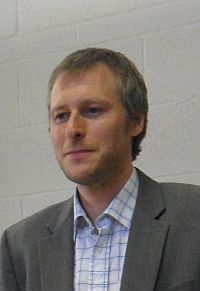Just because you can, doesn’t mean you should. With great power comes great responsibility. Is this the age of the rise of the truly ethical consultant?...

Dr Simon Davey
November 2018, the CMCE Global Symposium and the launch of the results of a research project “What skills will consultants need in 2030?” The room awaits with bated breath, a mix of expertise and experience, from fresh-faced business students to wise elderly consultants, seven decades of wisdom across the ages.
Does demographic change and technological change require change in the nature of consultancy skills? Or indeed their application? We know (or at least we think we know) the pace of change is ever increasing. Yet what does it mean to be human in the world of consultancy?
The research study covered seven themes: self-employment, globalisation, artificial intelligence (AI), big data, robotics, internet of things (IoT) and cyber security, whilst also acknowledging the nature of the consultant’s timeless skills.
This article is the opinion of its author, drawing threads from the report and the symposium and may disagree with some elements of the findings of the report. The symposium has been reported under the Chatham House Rule [1].
Do management consultants over-complicate things?
Yes, why would they not? There is an unfortunate inherent self-interest in over-complication. Yet there is increasing demand for simplification and simple, straight consultancy. Yes, there is a need for strategic overhaul, for creative disruption, for doing better things (as well as doing things better); but there is much to be gained by intelligent application of ‘marginal gains’ [2]. Find a problem, resolve it and embed the solution. Managed evolution rather than revolution; or as Jim Collins would say, “Fire bullets, not cannonballs.”
Self-employment: Big 4 or little million
There are increasing numbers of solo practitioners competing with the deep pocket large incumbents in the consultancy market. They provide key expertise and experience in a niche and offer a different perspective, whilst still potentially remaining the glue that holds organisations together. They are agile, often hungry, sometimes younger with fresh thinking. Yet to succeed, without the base of the corporate machine, they require sales skills, networking and contracting as well as delivery skills; have to invest their own time in development and growing exceptional; and their success depends not just on reputation and credibility (which is partly sourced from others and the crowd) but on trust. The essential human element of trust. Advice without trust and credibility is redundant (although it may get you a paycheque).
Globalisation
The world grows more digital and more virtual because it can, not because it should. With a relentless pace of change (from the tools we use to

A once proud lion, confined to
the bins...
communicate, but not how we communicate and engage) to paranoia caused by lack of understanding; (the so called expert at the top of the pyramid feeling deep ‘imposter syndrome’ as their knowledge and all they knew to be true dies a death); and decreasing trust in experts (why, because they’re not always right; or because they think they’re right when they’re clearly wrong and lack the humility we expect).
Artificial intelligence (or augmented?)
At school in the 1970s we were taught about the future of robots and the coming age of leisure. Whilst we have (in most of Western society at least) seen the back of mangles, oil lamps and killing our own food, robotics hasn’t yet delivered the promise (or the parcel). Big data, managed and processed by artificial intelligence, driving RPA (robotic process automation) can make a difference in some environments; but what about judgement? Of asking (and framing) the right questions? The ‘What’ may be predictable but the ‘How’ becomes the differentiator. Who controls the ethics and accountability, and what about the rising tide which is the Technological Singularity?
Big data
In the late 1990s, I had a big argument with a major pharmaceutical company. They screened hundreds of thousands of compounds a year but couldn’t tell me why. It felt like a numbers game; play enough lines on the lottery and you’ll win, never mind the cost.
Data analysis is now cheap (if not cheerful) although consumers are concerned about privacy and few really understand GDPR at the coal face. There is an emerging market in data analysts and data scientists but a lack of skills in communication and translation; so that said analysts and scientists can focus on the right thing at the right time with the right resource and investment. If the Finance Director doesn’t understand what you are doing and why, don’t bet on the money to do it. If the CEO doesn’t understand, you might not be allowed to try.
Robotics
Is this new wine in old skins? Are we moving to software and platforms rather than consultancy time? And what of the value of human-robot parents; literally where AI becomes augmented intelligence. Thirty years ago I wrote a dissertation on paper by hand, manually inspecting books for individual facts and references. Today, I edit with my word processors, Googling anything I want to know. Augmentation of a sort. In time, perhaps these articles and reports will write themselves (albeit without the same sense of personality?). Some work is redundant. Our success in differentiating will be in defining where we add the greatest value and in what we can trust the machine to do as well as or better than us.
Internet of Things
IoT will doubtless impact on business models, strategy and supply chains. True ‘Just In Time’ as the system orders for you. Yet, do the clients understand the application and what happens when someone hacks it? Yes, it may not matter if your central heating goes on or off; but knocking out a power station and sending the increasingly electricity-dependent world into darkness? Which brings us neatly to…
Cybersecurity
Yes, technology is irrelevant without cybersecurity. We’re still in Rumsfeld [United States Secretary of Defense in 2002, Donald Rumsfeld] territory here – “unknown unknowns” – and the regulators aren’t on top of it either. Whether an alleged Chinese plot embedding a single computer chip in the motherboard of computers [3] used by American powerhouse companies and the government (cheaper to manufacture in China) will bring us down unexpectedly or offering our nuclear power facilities to the control of ‘former hostile’ and perhaps ‘future hostile’ state actors or the knowledge that script kiddies can bring down entire networks (including the NHS) from the comfort of their bedroom. This is risk management, not pure tech, but requires knowledge and understanding of tech to be credible to the C-suite.
And timeless consulting skills?
Yet what of stakeholder management? (Robots don’t yet do behaviour change, even if the analytics know what you’re thinking); project management; interviewing (well, perhaps an avatar with a nice voice asking the questions?); change management, leadership… People and relationships are increasingly important – we want to be heard, listened to, acknowledged; and we trust based on emotion, not just cold hard facts. This is what it means to be human and this is what clients need.
What does 12 years ago tell us about twelve years ahead?
To look forward, let’s look back. Where was the world in 2006? There were no iPhones but they were predictable; the world of interaction changed through Facebook and Tinder; M-Pesa appeared and changed the world of money transfer, enabling wonderful things across Africa [4].
AI’s current challenge, but improving, is sentiment and natural language – Alexa, Siri et al are not quite there [5].
We need to train AI well – human ‘bias’ replicated is dangerous (Microsoft’s Taybot [6], which took less than a day to become a racist misogynist is a

When flying doesn't cut it - think
outside the box...
prescient example of that; but who would train their bot on Twitter anyway? – the literal echo chamber). We need the right people (perhaps younger junior consultants) to train AI to remove bias and provide balance, although we need to find unbiased junior consultants.
Biodata can revolutionise insurance – predict with greater accuracy and less risk – but potentially at the expense of the poorer and less healthy; – is this future good? AI ethics is as key as AI itself. Just because you can, doesn’t mean you should. We need to adjust what we do based on training data better; understanding the insights and the ethical use of data. With great power comes great responsibility. Is this the age of the rise of the truly ethical consultant?
With each new generation, new learned experiences and different cultures offer a new opportunity to shape systems and move us forward. Yes, more augmented, less artificial, in AI.
Change will be radical as well as incremental – so we need to let go of legacy or be disrupted out (as Blockbuster and Kodak found). A generation will forsake learning to drive; and visiting a bank branch – what’s the point?
We need to think trust, think globalisation, think explainability. If you can’t sell it or influence it, it’s redundant.
The new world and New Power
‘New power’ [7][8] is about relationships and systemic thinking. Relationships between individuals and institutions; state and market; East and West; authority and authenticity. Relationships are about involvement, belonging, fellowship; not ‘resources movement’. What does this mean for process consulting?
The State takes increasing risk, under whose guidance, in buying fighter jets that take 300 specialist software engineers to keep them in the air. There is no fresh thinking in how the NHS can adequately support the ageing population without pumping in more money. We need systemic redesign. We need to understand social, political and economic underpinnings to see where technology is going and what best role it might play. We need to think of new power models and of the connectivity of business and technology to society.
Naivety
Historically, we haven’t been good at understanding what things mean and where they go. Why didn’t Christies invent eBay or RBS, Paypal?

When you haven't got your ducks in a row...
Clients increasingly need leading and taking, not just pointing along. The key threat is for those (consultants as well as clients) who don’t see the opportunities and threats and, above all, fail to execute. The important thing about the long term is to make sure you’re part of it.
We need to reinvent and reinforce responsibilities and accountabilities when leading in a paucity of expertise and knowledge. The consultant is a trusted advisor, and consultants are likely to be critical to the new ‘how’ as well as surfacing the ‘why’, even if AI, data and tech becomes increasingly responsible for the ‘what’. In a world of complexity, rapid change and paranoia, maybe what consultants will increasingly sell is reassurance; which brings us neatly back to the need for trust, credibility and reputation built on relationships as well as expertise and experience.
We also need to ensure we keep learning (and become more efficient and effective learners). Knowledge is increasingly redundant but the intelligent application of knowledge and the continual, appropriate reinvention, offers us individually, and collectively, a greater opportunity in the future.
Conclusion
Perhaps a closing line should go to Edmund Burke, for providing the ultimate reflection on management consultancy: “An ignorant man, who is not fool enough to meddle with his clock, is however sufficiently confident to think he can safely take to pieces, and put together at his pleasure, a moral machine of another guise, importance and complexity, composed of far other wheels, and springs, and balances, and counteracting and co-operating powers. Men little think how immorally they act in rashly meddling with what they do not understand. Their delusive good intention is no sort of excuse for their presumption. They who truly mean well must be fearful of acting ill.”
We need to listen, to understand, to acknowledge, to use data, technology and robotics, but ultimately to learn to exercise our judgement, humility, trust and communication (as consultants and clients).
and communication (as consultants and clients).
To do good. For what else is consultancy for and has ever been (even assuming the basic need for appropriate reward)? Augmentation will open the market, eliminate redundancy and ultimately give us more headspace and time to reflect and resolve the real issues, and to bring leaders and society with us.
That is how we will effect change and likely the key application of management consultancy in 2030.
Dr Simon Davey, January 2019
REFERENCES
[1] Chatham House Rule - https://www.chathamhouse.org/chatham-house-rule
[2] Marginal gains - https://jamesclear.com/marginal-gains
[3] Chinese Motherboard Hack is a Crisis Even If It Didn’t Happen - https://www.theatlantic.com/technology/archive/2018/10/political-cost-chinese-hardware-hack/572383/
[4] M-Pesa - https://en.wikipedia.org/wiki/M-Pesa
[5] Scottish voice activated lift (note, contains offensive language) - https://www.youtube.com/watch?v=J3lYLphzAnw
[6] Taybot - https://www.theverge.com/2016/3/24/11297050/tay-microsoft-chatbot-racist
[7] This is New Power - https://thisisnewpower.com/
[8] Understanding New Power - https://hbr.org/2014/12/understanding-new-power
[9] Consulting Skills for the Future report – for a copy of the report please email info@cmce.org.uk
ACKNOWLEDGEMENTS
The author thanks the speakers: Chris Sutton, Mark Goyder, George Cox and Chris Hay as well as the contributions of colleagues from the floor.